Evolution

ONE HUNDRED YEARS ago, in July of 1925, a trial — the Scopes trial — captivated the nation. It was, in a sense, a shot heard round the world, for it too was delivered in defense of freedom. In this case, though, the freedom to worship and to learn was at stake.
A few months earlier, the Tennessee state legislature had passed the Butler Act, a law forbidding public schools to teach “any theory that denies the story of the Divine Creation of man as taught in the Bible, and to teach instead that man has descended from a lower order of animals.”
The five-year-old American Civil Liberties Union (ACLU) considered the Tennessee law to be a flagrant violation of the U.S. Constitution’s First Amendment, which stipulates the separation of church and state. It announced that it would defend a Tennessee public school teacher who would test the law in the courts by breaking it.
In Dayton, a town of no more than 2,000 in the eastern part of the state, a young substitute biology instructor named John Scopes stepped up. You can’t teach biology without teaching evolution, Scopes said, and he’d used the existing state-sponsored biology textbook in his class. This textbook included a short discussion of evolution, which by 1925 was considered settled and foundational scientific theory in both the scientific and academic communities.
Soon an international sensation, the Scopes trial — its implications — cut to the heart of democracy, for it asked who should determine what people should know or read or learn or worship and how that determination would be made. And the questions raised are as pertinent today as they were one hundred years ago.
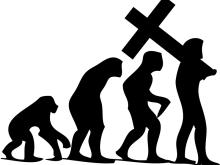
Sure, there are loud voices that seem to feed into certain conclusions about what religious people think about science and scientists. (Consider creationist Ken Ham’s attempts to discredit the theory of evolution.) But, as with any issue, the loudest or most prominent voices are not necessarily the most representative.

“We’ve added definition to the picture of evolution that has deepened and enriched our understanding of biological processes,” Donovan Schaefer, an Oxford lecturer in science and religion who co-organized the conference, told the opening session of the July 19-22 meeting.
But he added: “It would be naive to imagine that the grander questions about biology, religion, the humanities, and evolutionary theory generally have been put to death.”

After a quarter-century, the Rev. Barry Lynn is retiring as head of Americans United for Separation of Church and State.
In court, in congressional hearings, and on cable television, Lynn has led the fight against school-sponsored prayer, religious symbols on public property, and any law that allows government to privilege people of faith.

Creationist Christian tourists may soon flock to the Ark Encounter, a literal vision of Noah’s story in Genesis come to life in July as a theology-packed tourist attraction in Williamstown, Ky.

In 2005, a federal judge ruled that “intelligent design” — the idea that life is so complex it must have involved some sort of supernatural creator — isn’t science, but religion in disguise.
Science educators heralded the decision, and many thought it spelled the end of creationism in public schools.
They were wrong.

Meet the “Post-Seculars” — the one in five Americans who no one seems to have noticed before in endless rounds of debates pitting science vs. religion.
They’re more strongly religious than most “Traditionals” (43 percent of Americans) and more scientifically knowledgeable than “Moderns” (36 percent) who stand on science alone, according to two sociologists’ findings in a new study.
“We were surprised to find this pretty big group (21 percent) who are pretty knowledgeable and appreciative about science and technology but who are also very religious and who reject certain scientific theories,” said Timothy O’Brien, co-author of the research study, released Jan. 29 in the American Sociological Review.
Put another way, there’s a sizable chunk of Americans out there who are both religious and scientifically minded but who break with both packs when faith and science collide.

In the past few months I have come to a rather substantial conclusion: I cannot slow down time. Try as I might, my oldest daughter is now four and a half and is practically sprinting her way to "big kid school." My wife and I have been discussing this next phase of our daughter’s life. Sadly, school districts are falling into massive debt, being subjected to low performance in the classroom and even apathy in educating the next generation. Schools have become too focused on state test scores and benchmarks and have removed the art of learning from many classrooms.
Now private schools are becoming more mainstream, offering alternatives to public education, more flexibility, and more opportunities to the students. For many private schools there is a common element: they are associated with a religious group or Christian denomination. These schools started out as an extension of the ministry of the church as a way to respond to the needs of the community. But over time many popped up as a rejection of the educational system and their "removal" of God or prayer the school. Many parents see disconnect between the mainstream educational system and their Christian households.
But I see a certain danger in some of these Christian alternatives. It might sound counterintuitive for an ordained Christian minister to say, but there are a few reasons I would not send my daughter to some Christian schools.
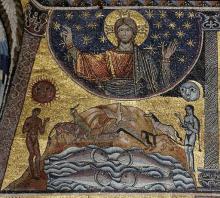
Pope Francis on Oct. 27 waded into the controversial debate over the origins of human life, saying the big bang theory did not contradict the role of a divine creator, but even required it.
The pope was addressing the plenary assembly of the Pontifical Academy of Sciences, which gathered at the Vatican to discuss “Evolving Concepts of Nature.”
“When we read about Creation in Genesis, we run the risk of imagining God was a magician, with a magic wand able to do everything. But that is not so,” Francis said.
“He created human beings and let them develop according to the internal laws that he gave to each one so they would reach their fulfillment.”
Francis said the beginning of the world was not “a work of chaos” but created from a principle of love. He said sometimes competing beliefs in creation and evolution could co-exist.
PRIOR TO MY conversion to Christianity, I was the roving reggae reporter for High Times, a magazine dedicated to marijuana culture. I also wrote music reviews for NY Press, Virgin Records, and various other publications.
One of my favorite artists from the early 2000s was Cody Chesnutt (he spells his name with two capital Ts at the end), an independent recording artist popularly known for his hit song “Seed 2.0,” a soulful rock and hip-hop hybrid released in 2002 with The Roots.
Chesnutt’s musical debut was a lo-fi soul and rock-and-roll album titled The Headphone Masterpiece. It was a double disc (this was still the heyday of compact discs) that he recorded on a 4-track recorder in the bedroom of his Los Angeles apartment. He played all the instruments—guitar, bass, keyboard, and organ. The sound quality and lyrical content are both intentionally gritty.
Headphone quickly became the soundtrack to my college years. I was a reveler, filled with hypersexual bravado and abundant egotism, and Chesnutt’s music reinforced and undergirded my misdirected youthful zeal. His lyrics were unrepentantly misogynistic, and his strong sense of self pervaded each track. He exploited his infidelity and womanizing in his music, at times in a prophetic way, such as in “My Women, My Guitars,” which he opens with incredibly crude lyrics, but later croons with utmost vulnerability: “Man, something’s been killing me. My women, my guitars. I’ve been living hard. My breakdown is on the way. I know my breakdown is on the way. So I get up on my feet. Falling back on my knees to pray.”
Colloquially known as the “Monkey Trial,” the Tennessee v. John Scopes trial ended on July 21, 1925, but 89 years later, the American public is still debating on where it stands with religion and science education.
John Scopes, a public school teacher, was charged by the state for teaching evolution because one of its laws prohibited any public school curricula that contradicted creationism. The trial began on July 10, 1925, and Scopes pled not guilty. Along with other members of the community, Scopes had planned the curriculum as a publicity stunt.
Eighty-nine years ago today, Scopes was found guilty and sentenced to pay a $100 fine — an estimated $1,300, when adjusted for inflation.

In just the latest evidence that a certain subset of conservative evangelical Christians really has no interest in occupying the real world with the rest of us, the trailer for a new movie called A Matter of Faith has hit the Internet.
The film follows the travails of a Christian father, who — horrified by the fact that his daughter’s college teaches the theory of evolution as a fact (gasp!) — challenges the villainous biology professor to a public debate that will no doubt settle the matter once and for all.
If this premise sounds strangely familiar, it could be that you’re remembering God’s Not Dead, a film released in March, in which a Christian student who — horrified by the fact that his philosophy professor is a committed atheist — challenges the dastardly nonbeliever to a debate on the existence of God that, no doubt, settled the matter once and for all.
(I’m told that the new movie was called Christians vs. the Straw Man II: This Time It’s Personal throughout production, before filmmakers decided to rename it A Matter of Faith.)
The similarities between the two pictures don’t stop there.
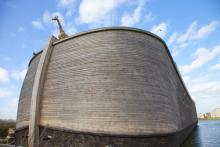
Every so often, the young-earth groups come up with an idea that is just so plainly, utterly, obviously wrong — in every sense of the word — that it demands a response from a larger subset of believers. To do otherwise would be to make a mockery of the Christ we claim to follow — a man who was hated by the religious establishment of the day precisely because he called them out for their hypocrisy and refused to let them claim divine fiat for their immoral actions.
I'm speaking of the so-called Ark Encounter. If you're not familiar with the project, it's the latest brainchild of Ken Ham (of recent "Ham on Nye" fame) and AiG, a planned "biblical" theme park centered around a scale, wooden replica of Noah's ark, constructed according to the instructions in Genesis (except this one will be built by teams of modern-day professionals rather than a single, unskilled old man, won’t be seaworthy, and won’t hold two of every unclean animal and 14 of every clean one).
Ham and his team have been discussing these plans for years, but few outside their devoted following paid them much heed till now, probably because the project’s well-publicized funding issues led us all to believe the thing would never be built. But, according to a statement by Ham last week, enough investors are on board to “start” construction on the 510-foot-long, boat-shaped building. The cost of completing the first phase of the theme park has been estimated at more than $70 million.



A new film charting Charles Darwin’s passage from Christian to nonbeliever propelled its maker on a similar journey.
“Questioning Darwin,” a new, hourlong documentary airing on HBO throughout February, juxtaposes the story of the 19th-century British naturalist with looks into the lives of contemporary American Christians who believe the world was created in six days, as described in the Book of Genesis.
Antony Thomas, the 73-year-old British filmmaker behind the camera, said while his goal was to highlight the way his subjects answered big questions about the origins of life, a loving God, and the purpose of suffering, he found his own answers to those questions changing.
“This is a personal feeling, but I do believe the two [a belief in God and in evolution] are not compatible,” Thomas said by telephone from New York, where he is working on another documentary. “And that is what made this worthwhile for me.”
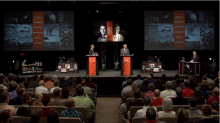
There was a moment during last week’s “debate” between Bill Nye the Science Guy and young-earth creationist Ken Ham that I think was more telling than any other.
During the Q&A session, Ham was asked what seemed to me to be a very simple question: “Hypothetically, if evidence existed that caused you to admit that the universe is older than 10,000 years and creation did not occur in six days, would you still believe in God, and the historical Jesus of Nazareth, and that Jesus was the son of God?”
What was most telling was not really what Ham said, as much as what he didn’t say, which was “Yes.”
In my mind, this question was a softball pitch. It couldn’t possibly be easier. And Ham was given two minutes to answer the thing? His response should have taken all of two seconds: “Yes.”
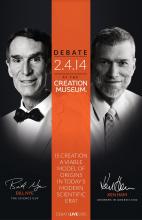
Whenever I hear about someone else making a case for Young Earth Creationism in the name of Christianity, I’m embarrassed, once again, to associate myself with them. And people wonder why many of us prefer to identify as “Jesus followers” or “Spiritual but not Religious” rather than be lumped in with the Ken Hams of the world.
Duh.
The thing is, a healthy number of us who consider ourselves to be Christian embrace science. We think critically. We accept the likelihood that much we think we understand about the world, the universe, and about our faith can (and should) change as we learn new things. We understand that faith is more about questions than answers, and that the prime mover in our faith practice is to be more like Jesus in our own daily walk, rather than focusing so much on making others more like us.
The desire of a vocal minority (yes, that’s what I said, and I meant it) of Christians to cling to a notion that the entire universe is a few thousand years old, despite the clear physical evidence to the contrary, points less to a reasonable alternate view of the observable world. Rather, it points to a desperate attempt to maintain a dying voice in the cultural conversation.
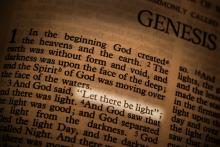
If you perused some of the headlines coming out of Slate the past couple weeks, you’ll find that, not only are Texas schools teaching creationism , schools all over the country are teaching creationism , and — even as we speak — lawmakers in South Dakota and elsewhere are introducing legislation that will let their schools teach creationism.
Such news leads me to one of two conclusions: Either the proponents of teaching creationism — a viewpoint I thought it was ruled unconstitutional by the Supreme Court in 1987 — have been very busy lately, or what passes for “creationism” in the eyes of the mainstream media these days has become pretty fuzzy.
I lean toward the latter.
Look, I’m a writer and a journalist, too. I get it. I understand the desire for a sexy, emotionally heavy word that “seems” to describe the given topic and will — of course — generates millions of clicks from the churning, polarized body politic that powers the Interwebs.
But this willy-nilly misapplication of the terms “creationist” and “creationism” simply has got to stop, and here’s why.

Bill Nye may be “The Science Guy,” but Ken Ham is the “Answers in Genesis” man, and a debate between the two over the origins of life has nonbelievers and Christians wringing their hands.
Nye, host of a beloved television science series, and Ham, president of a creationist apologetics ministry, will meet at the Creation Museum, where Ham is also the president, on Feb. 4. In what some wags are calling “the Ham-on-Nye debate,” they will weigh this question: “Is creation a viable model of origins?”
In truth, both sides answered that question long ago — Nye with Charles Darwin’s work on the origin of species and Ham with the first book of the Bible. Yet many observers — both religious and nonreligious — say the debate is a very bad idea.